新起点大学英语第二册翻译
- 格式:docx
- 大小:30.87 KB
- 文档页数:4
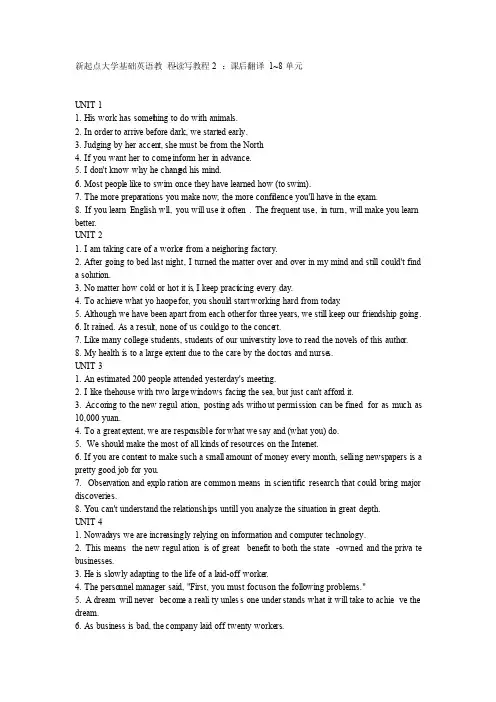
新起点大学基础英语教程-读写教程2:课后翻译1~8单元UNIT 11. His work has someth ing to do with animal s.2. In orderto arrive before dark, we starte d early.3. Judgin g by her accent, she must be from the North.4. If you want her to come, inform her in advanc e.5. I don't know why he change d his mind.6. Most people like to swim once they have learne d how (to swim).7. The more prepar ation s you make now, the more confid enceyou'll have in the exam.8. If you learnEnglis h wll, you will use it often. The freque nt use, in turn, will make you learnbetter.UNIT 21. I am taking care of a worker from a neigho ringfactor y.2. Aftergoingto bed last night, I turned the matter over and over in my mind and stillcould't finda soluti on.3. No matter how cold or hot it is, I keep practi cingeveryday.4. To achiev e what yo haopefor, you should startworkin g hard from today.5. Althou gh we have been apartfrom each otherfor threeyears, we stillkeep our friend shipgoing.6. It rained. As a result, none of us couldgo to the concer t.7. Like many colleg e studen ts, studen ts of our univer stity love to read the novels of this author.8. My health is to a largeextent due to the care by the doctor s and nurses.UNIT 31. An estima ted 200 people attend ed yester day's meetin g.2. I like thehou se with two largewindow s facing the sea, but just can't afford it.3. Accori ng to the new regula tion,postin g ads withou t permis sioncan be finedfor as much as 10,000 yuan.4. To a greatextent, we are respon sible for what we say and (what you) do.5. We should make the most of all kindsof resour ces on the Intern et.6. If you are conten t to make such a smallamount of moneyeverymonth, sellin g newspa persis a pretty good job for you.7. Observ ation and explor ation are common meansin scient ificresear ch that couldbringmajordiscov eries.8. You can't unders tandthe relati onshi ps untill you analyz e the situat ion in greatdepth.UNIT 41. Nowada ys we are increa singl y relyin g on inform ation and comput er techno logy.2. This meansthe new regula tionis of greatbenefi t to both the state-ownedand the privat e busine sses.3. He is slowly adapti ng to the life of a laid-off worker.4. The person nel manage r said, "First, you must focuson the follow ing proble ms."5. A dreamwill neverbecome a realit y unless one unders tands what it will take to achiev e the dream.6. As busine ss is bad, the compan y laid off twenty worker s.7. The produc ts manufa cture ed by this compan y are for specif ic purpos es.8. Peteris huntin g for a job now, as his moneywill only last him one month.UNIT 51. We have decide d to settle the matter once and for all.2. I feel happythat my younge r brothe r has passed the entran ce examin ation of that famous univer sity.3. The love affair betwee n the two beganwith that strang e quarre l.4. As we expect, they have made greatprogre ss in theirresear ch on the causes of SARS.5. He accomp anied his speech with a lot of gestur es.6. So far, therehas been a lot of discus sionon whethe r destro yingthe enviro nment is agains t law.7. Gaspin g for breath, he ran out of the office, and took a taxi to the city librar y.8. I don't thinkyou should worryaboutyour compan y's curren t troubl es.UNIT 61. I rememb er the wholethingclearl y as if it happen ed yester day.2. I regard that movieas one of the worstI've ever seen.3. The new Five-Year-Plan is beingcarrie d out in all fields.4. In spiteof all his effort s, he failed in the end.5. When the rightopport unity comesalong, he'll take it.6. The planet was namedafterits discov erer.7. It took them one year to buildthe house.8. I'm sure her knowle dge of Englis h is adequa te for the job.UNIT 71. She is very carefu l. She won't take a risk when drivin g.2. Thosewho have a passio n for footba ll can experi encegreatenjoym ent.3. In additi on to teenag ers, malesand female s of otherages also enjoymounta ineer ing.4. His studen ts looked upon him with respec t.5. It was Dr. Smiththat/ whom we invite d/ who was invite d to give us a lectur e.6. One of the advant agesof e-mail over regula r mail is that it is fast.7. Only with good health, can we studywell and work well.8. If you compar e Tom with his classm ates, you will find he workshard and knowshow to relax. UNIT 81. The mother went out to work, so the father took respon sibil ity for lookin g afterthe childr en at home.2. Resear ch showsthat smokin g is direct ly relate d to lung cancer.3. Parent s should be concer ned abouttheirchildr en's perfor mance at school.4. Your too much worryover your health may really make you sick.5. The head of the villag e pointe d out that the tree had become a source of income, as touris ts had been coming from all partsof the countr y to see it.6. Mother said, "Chocol ate is okay, but only if you have one bar a day."7. Whethe r people are satisf ied with this policy outwei ghs all otherconsid erati ons.8. We should take less greasy food such as butter and eat as much fruitand vegeta blesas possib le to keep a balanc e diet.。
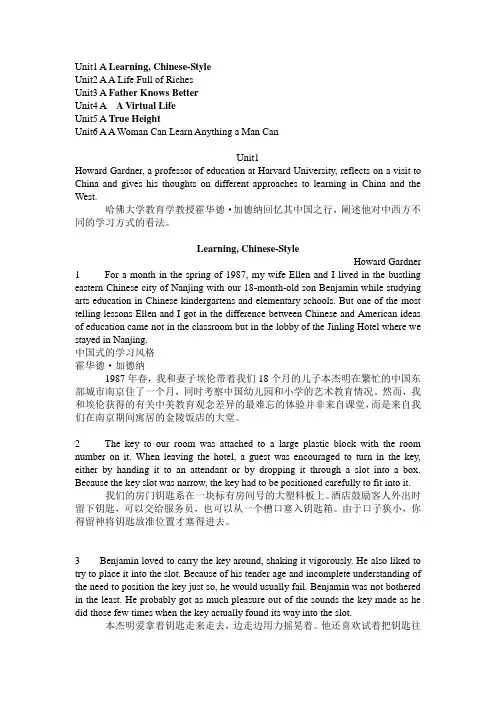
Unit1 A Learning, Chinese-StyleUnit2 A A Life Full of RichesUnit3 A Father Knows BetterUnit4 A A Virtual LifeUnit5 A True HeightUnit6 A A Woman Can Learn Anything a Man CanUnit1Howard Gardner, a professor of education at Harvard University, reflects on a visit to China and gives his thoughts on different approaches to learning in China and the West.哈佛大学教育学教授霍华德·加德纳回忆其中国之行,阐述他对中西方不同的学习方式的看法。
Learning, Chinese-StyleHoward Gardner 1 For a month in the spring of 1987, my wife Ellen and I lived in the bustling eastern Chinese city of Nanjing with our 18-month-old son Benjamin while studying arts education in Chinese kindergartens and elementary schools. But one of the most telling lessons Ellen and I got in the difference between Chinese and American ideas of education came not in the classroom but in the lobby of the Jinling Hotel where we stayed in Nanjing.中国式的学习风格霍华德·加德纳1987年春,我和妻子埃伦带着我们18个月的儿子本杰明在繁忙的中国东部城市南京住了一个月,同时考察中国幼儿园和小学的艺术教育情况。
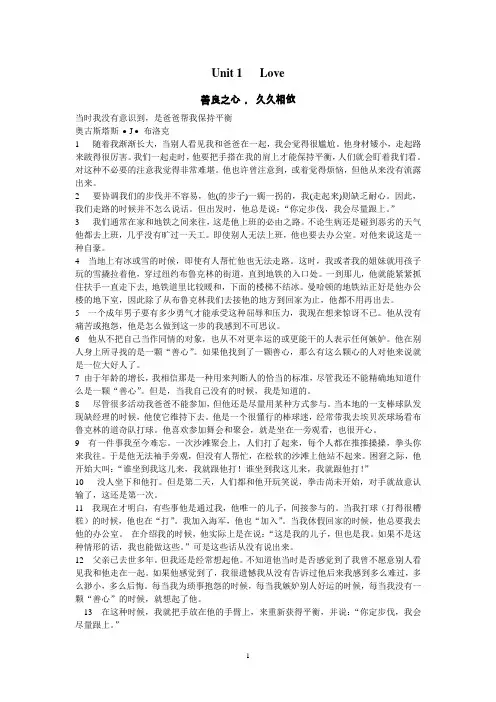
Unit 1 Love善良之心,久久相依当时我没有意识到,是爸爸帮我保持平衡奥古斯塔斯∙ J ∙布洛克1 随着我渐渐长大,当别人看见我和爸爸在一起,我会觉得很尴尬。
他身材矮小,走起路来跛得很厉害。
我们一起走时,他要把手搭在我的肩上才能保持平衡,人们就会盯着我们看。
对这种不必要的注意我觉得非常难堪。
他也许曾注意到,或着觉得烦恼,但他从来没有流露出来。
2 要协调我们的步伐并不容易,他(的步子)一瘸一拐的,我(走起来)则缺乏耐心。
因此,我们走路的时候并不怎么说话。
但出发时,他总是说:“你定步伐,我会尽量跟上。
”3 我们通常在家和地铁之间来往,这是他上班的必由之路。
不论生病还是碰到恶劣的天气他都去上班,几乎没有旷过一天工。
即使别人无法上班,他也要去办公室。
对他来说这是一种自豪。
4 当地上有冰或雪的时候,即使有人帮忙他也无法走路。
这时,我或者我的姐妹就用孩子玩的雪撬拉着他,穿过纽约布鲁克林的街道,直到地铁的入口处。
一到那儿,他就能紧紧抓住扶手一直走下去, 地铁道里比较暖和,下面的楼梯不结冰。
曼哈顿的地铁站正好是他办公楼的地下室,因此除了从布鲁克林我们去接他的地方到回家为止,他都不用再出去。
5 一个成年男子要有多少勇气才能承受这种屈辱和压力,我现在想来惊讶不已。
他从没有痛苦或抱怨,他是怎么做到这一步的我感到不可思议。
6 他从不把自己当作同情的对象,也从不对更幸运的或更能干的人表示任何嫉妒。
他在别人身上所寻找的是一颗“善心”。
如果他找到了一颗善心,那么有这么颗心的人对他来说就是一位大好人了。
7 由于年龄的增长,我相信那是一种用来判断人的恰当的标准,尽管我还不能精确地知道什么是一颗“善心”。
但是,当我自己没有的时候,我是知道的。
8 尽管很多活动我爸爸不能参加,但他还是尽量用某种方式参与。
当本地的一支棒球队发现缺经理的时候,他使它维持下去。
他是一个很懂行的棒球迷,经常带我去埃贝茨球场看布鲁克林的道奇队打球。
他喜欢参加舞会和聚会,就是坐在一旁观看,也很开心。
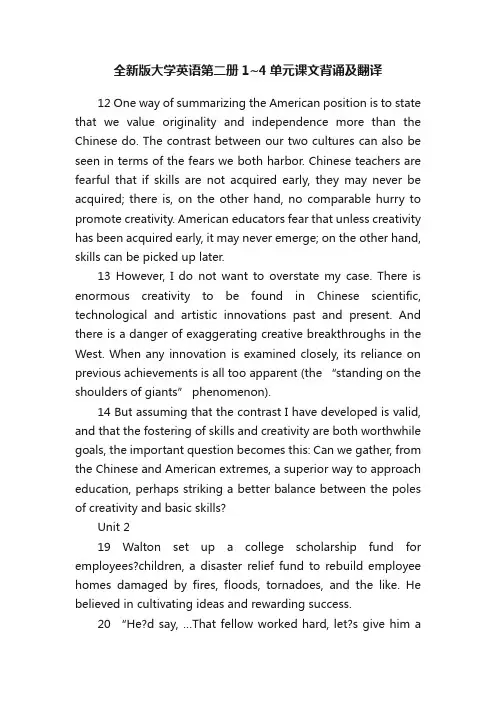
全新版大学英语第二册1~4单元课文背诵及翻译12 One way of summarizing the American position is to state that we value originality and independence more than the Chinese do. The contrast between our two cultures can also be seen in terms of the fears we both harbor. Chinese teachers are fearful that if skills are not acquired early, they may never be acquired; there is, on the other hand, no comparable hurry to promote creativity. American educators fear that unless creativity has been acquired early, it may never emerge; on the other hand, skills can be picked up later.13 However, I do not want to overstate my case. There is enormous creativity to be found in Chinese scientific, technological and artistic innovations past and present. And there is a danger of exaggerating creative breakthroughs in the West. When any innovation is examined closely, its reliance on previous achievements is all too apparent (the “standing on the shoulders of giants” phenomenon).14 But assuming that the contrast I have developed is valid, and that the fostering of skills and creativity are both worthwhile goals, the important question becomes this: Can we gather, from the Chinese and American extremes, a superior way to approach education, perhaps striking a better balance between the poles of creativity and basic skills?Unit 219 Walton set up a college scholarship fund for employees?children, a disaster relief fund to rebuild employee homes damaged by fires, floods, tornadoes, and the like. He believed in cultivating ideas and rewarding success.20 “He?d say, …That fell ow worked hard, let?s give him alittle extra,?”recalls retired president Ferold F. Arend, who was stunned at such generosity after the stingy employer he left to join Wal-Mart. “I had to change my way of thinking when I came aboard.”21 “The reason for our success,” says Walton, in a company handout, “is our people and the way they?re treated and the way they feel about their company. They believe things are different here, but they deserve the credit.”22 Adds company lawyer Jim Hendren: “I?ve never seen anyone yet who worked for him or was around him for any length of time who wasn?t better off. And I don?t mean just financially, although a lot of people are. It?s just something about him—coming into contact with Sam Walton just makes you a better person.”12 美国人的立场可以概括起来这么说,我们比中国人更重视创造和自立。
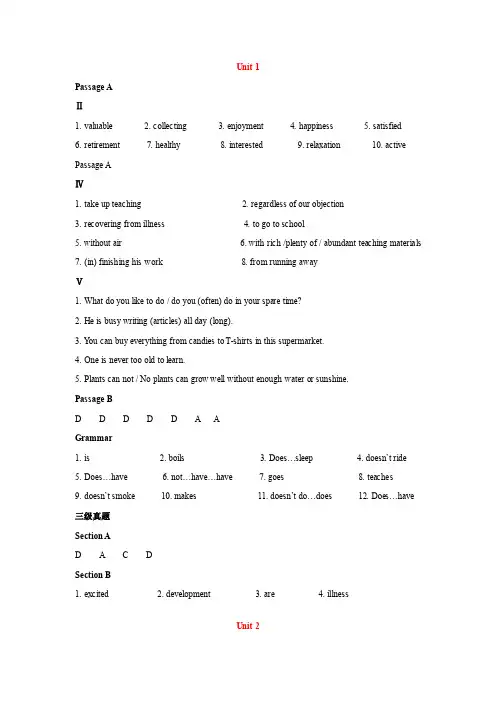
Unit 1Passage AⅡ1. valuable2. collecting3. enjoyment4. happiness5. satisfied6. retirement7. healthy8. interested9. relaxation 10. active Passage AⅣ1. take up teaching2. regardless of our objection3. recovering from illness4. to go to school5. without air6. with rich /plenty of / abundant teaching materials7. (in) finishing his work8. from running awayⅤ1. What do you like to do / do you (often) do in your spare time?2. He is busy writing (articles) all day (long).3. Y ou can buy everything from candies to T-shirts in this supermarket.4. One is never too old to learn.5. Plants can not / No plants can grow well without enough water or sunshine.Passage BD D D D D A AGrammar1. is2. boils3. Does…sleep4. doesn’t ride5. Does…have6. not…have…have7. goes8. teache s9. doesn’t smoke 10. makes 11. doesn’t do…does 12. Does…have 三级真题Section AD A C DSection B1. excited2. development3. are4. illnessUnit 2Passage AII1. staying2.being improved /improving /improved3.effective4.pleasantly.5. patience .6.advice7.participants8.secondary9.punctually(['pʌŋktjuəl ['pʌŋktʃuəl])10.gratefullyIII.Course1. 这项工作将在本周内完成。
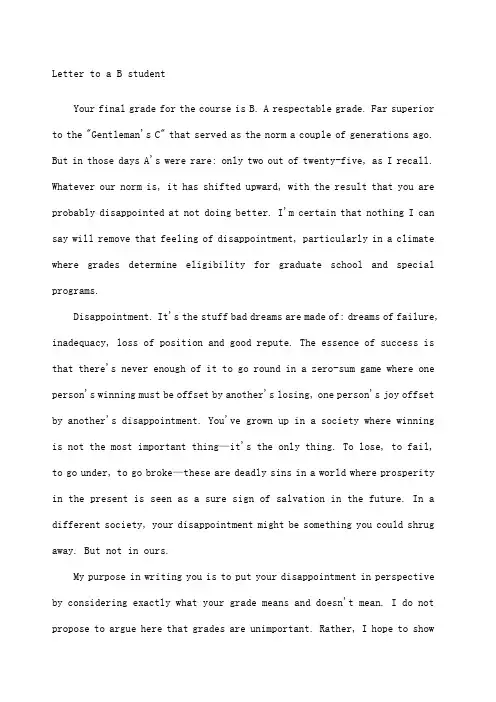
Letter to a B studentYour final grade for the course is B. A respectable grade. Far superior to the "Gentleman's C" that served as the norm a couple of generations ago. But in those days A's were rare: only two out of twenty-five, as I recall. Whatever our norm is, it has shifted upward, with the result that you are probably disappointed at not doing better. I'm certain that nothing I can say will remove that feeling of disappointment, particularly in a climate where grades determine eligibility for graduate school and special programs.Disappointment. It's the stuff bad dreams are made of: dreams of failure, inadequacy, loss of position and good repute. The essence of success is that there's never enough of it to go round in a zero-sum game where one person's winning must be offset by another's losing, one person's joy offset by another's disappointment. You've grown up in a society where winning is not the most important thing—it's the only thing. To lose, to fail, to go under, to go broke—these are deadly sins in a world where prosperity in the present is seen as a sure sign of salvation in the future. In a different society, your disappointment might be something you could shrug away. But not in ours.My purpose in writing you is to put your disappointment in perspective by considering exactly what your grade means and doesn't mean. I do not propose to argue here that grades are unimportant. Rather, I hope to showyou that your grade, taken at face value, is apt to be dangerously misleading, both to you and to others.As a symbol on your college transcript, your grade simply means that you have successfully completed a specific course of study, doing so at a certain level of proficiency. The level of your proficiency has been determined by your performance of rather conventional tasks: taking tests, writing papers and reports, and so forth. Your performance is generally assumed to correspond to the knowledge you have acquired and will retain. But this assumption, as we both know, is questionable; it may well be that you've actually gotten much more out of the course than your grade indicates—or less. Lacking more precise measurement tools, we must interpret your B as a rather fuzzy symbol at best, representing a questionable judgment of your mastery of the subject.Your grade does not represent a judgment of your basic ability or of your character. Courage, kindness, wisdom, good humor—these are the important characteristics of our species. Unfortunately they are not part of our curriculum. But they are important: crucially so, because they are always in short supply. If you value these characteristics in yourself, you will be valued—and far more so than those whose identities are measured only by little marks on a piece of paper. Your B is a price tag on a garment that is quite separate from the living, breathing human being underneath. The student as performer; the student as human being. The distinctionis one we should always keep in mind. I first learned it years ago when I got out of the service and went back to college. There were a lot of us then: older than the norm, in a hurry to get our degrees and move on, impatient with the tests and rituals of academic life. Not an easy group to handle.One instructor handled us very wisely, it seems to me. On Sunday evenings in particular, he would make a point of stopping in at a local bar frequented by many of the GI-Bill students. There he would sit and drink, joke, and swap stories with men in his class, men who had but recently put away their uniforms and identities: former platoon sergeants, bomber pilots, corporals, captains, lieutenants, commanders, majors—even a lieutenant colonel, as I recall. They enjoyed his company greatly, as he theirs. The next morning he would walk into class and give these same men a test. A hard test. A test on which he usually flunked about half of them.Oddly enough, the men whom he flunked did not resent it. Nor did they resent him for shifting suddenly from a friendly gear to a coercive one. Rather, they loved him, worked harder and harder at his course as the semester moved along, and ended up with a good grasp of his subject—economics. The technique is still rather difficult for me to explain; but I believe it can be described as one in which a clear distinction was made between the student as classroom performer and the student as human being. A good distinction to make. A distinction thatshould put your B in perspective—and your disappointment.Perspective. It is important to recognize that human beings, despite differences in class and educational labeling, are fundamentally hewn from the same material and knit together by common bonds of fear and joy, suffering and achievement. Warfare, sickness, disasters, public and private—these are the larger coordinates of life. To recognize them is to recognize that social labels are basically irrelevant and misleading. It is true that these labels are necessary in the functioning of a complex society as a way of letting us know who should be trusted to do what, with the result that we need to make distinctions on the basis of grades, degrees, rank, and responsibility. But these distinctions should never be taken seriously in human terms, either in the way we look at others or in the way we look at ourselves.Even in achievement terms, your B label does not mean that you are permanently defined as a B achievement person. I'm well aware that B students tend to get B's in the courses they take later on, just as A students tend to get A's. But academic work is a narrow, neatly defined highway compared to the unmapped rolling country you will encounter after you leave school. What you have learned may help you find your way about at first; later on you will have to shift to yourself, locating goals and opportunities in the same fog that hampers us all as we move toward the future.Letter to a B student 写给中等生的一封信你的期末成绩是一个B,一个过得去的等级;比许多年以前的及格C等级要优秀多了;但是A等级在那个年代是十分少见的,我回想起来25个人里只有两个人;但不管我们的标准如何,它们还是在提升的,不过你可能会因为这个结果为自己没有考好而失望;我相信我说什么都无法消除你们心中的失望情绪,特别是在一个社会环境下等级的高低直接决定了你考的学校和拿到的特别项目好坏;你的失望感;负面的展望由这种情绪形成:失败、努力不够、好位置与好名声的丧失;成功的核心是在零和博弈的游戏中没有批发的成功可以供给,有了一个人的失败才能成为另一个人成功的垫脚石;你所生所长的社会是唯成功论的,失败或者破产绝对是要命的罪恶;因为财富的多少明确的决定了未来能否被拯救;也许在另一个不一样的社会中,你对于失望的情绪能一笑而过,不过在我们的社会中不可能;我写这篇文章的目的是客观判断你们的失望情绪,认真考虑你的等级意味着什么与不能说明什么,我不想在这里争辩成绩无用论,相反我希望告诉你们的是,如果只是被它的外表所蒙蔽,那对于你们与他人来说,都是一种可怕的导向;作为大学成绩单的一种象征,你的成绩只能表明你已经成功的完成了特定课程的学习,达到了一定等级的熟练度;不过这种衡量你的表现的标准还是由传统的任务决定:参加考试、写论文报告等等;因为这种表现普遍认为应该与所掌握、记住知识的多少相结合,但是我们也知道这种假设是值得推敲的,有可能你学到的比成绩单上反应出来的要多,也有可能要少;在缺少更精准的测量工具的情况下,我们只能认为你的B代表着你对于这门学科的掌握不够,充其量是一个不明确的标志;你的成绩也不能成为衡量基本能力与性格的标准;勇气、善良、智慧、好脾气,这些才是我们人类的重要性格特征;虽然它们因为批发量少很重要,但不幸的是它们无法成为我们课程学习中的一部分;当然如果你看重自己拥有的这些性格特征,那么就总会有出头之日——而且远比那些只重视纸上那一点可怜分数的人好得多;你的B等级是衣服外的价格标签,穿上生活的衣裳后就与标签没有任何关系了;作为表现者与作为人类这个身份的学生是不一样的,这种差别需要我们时刻牢记;第一次学习这种区别是在我参军期重新回到校园的时候;当时有一大群像我一样的人,比一般的学生要老,着急着赶快获得学位继续生活,对学术生活里的习惯和考试极不耐烦;这是一群不怎么好对付的学生;我感觉其中一位用了一种明智的方法对付我们;每当星期天的晚上,他就会来到当地酒吧,那里总有许多GI-Bill的学生光顾;他会坐下来和他们喝酒、开玩笑,和班上的学生们分享各种故事;那些学生们最近刚换下他们参军的制服,有曾经排里的中士、轰炸机驾驶员、下士、陆军上尉、中尉、指挥官、陆军上校,其中甚至有陆军中校;所有人都十分享受与他交流,他自己也是;第二天早上,他会走进教室后分发卷子给所有人考试,一场会有一半人挂掉的艰难考试;奇怪的是,挂掉的那些人也不会讨厌他;他们也不会厌恶他身份的变化,从一个友善的朋友变成压迫性的老师;相反他们喜欢他所以会在他的课上不断努力学习,最终学期结束的时候很好的掌握这门课程——经济学;这样的教书技巧我都无法解释清楚,但我相信,他很好的区分了学生们的身份,作为教室里的学习者和单纯的人类身份;这样的区分客观的判断了你的失望与你得到的B;客观性;尽管人们在阶层上、获得教育的程度都不一样,但从根本上大家吸收的知识都来自相同的生活素材,也因为有共同的情感紧密连接,开心也好害怕也罢,遭受的痛苦与获得的成就;认识到这点是重要的;战争、疾病、公共和私人中的重大变故,这些是生活中更大的共通点;意识到这点后会发觉社会标签其实是一种基本的无关与误导;这些标签在复杂的社会职责分配中确实很有必要,我们需要知道能相信谁,他又能做什么,所以就有分数、等级、职位、责任的差异;但是从人性出发的时候这些真的不需要太过看重,看待自身还是别人都一样;即便是从成就看,B这个标签也并不意味着你永远就是只能达到B成就的人;我清楚的知道B档的学生以后还可能得到B就像A档学生还会更容易取得A;但是学术学习只是一条窄窄的限定好的高速公路,毕业出去后碰到的就是杂乱无章的田野,充满波折;你曾经学到的东西也许在开始能帮你找到要走的路,但接下来就都要靠自己,在阻止我们前行的漫天大雾中定位目标、找准机遇了;。
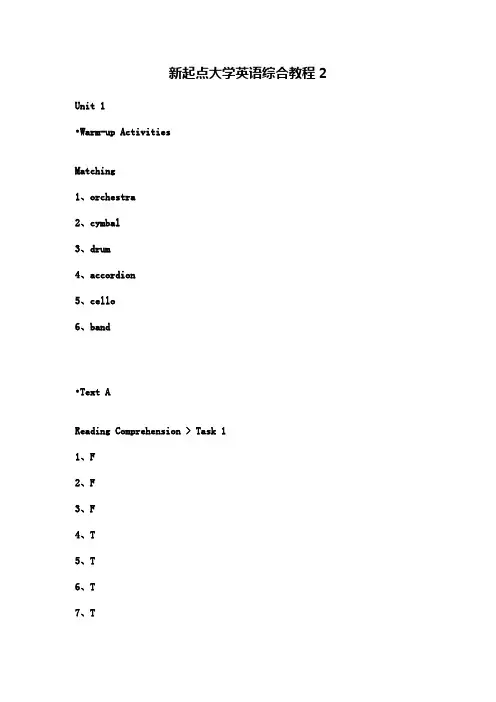
新起点大学英语综合教程2 Unit 1•Warm-up ActivitiesMatching1、orchestra2、cymbal3、drum4、accordion5、cello6、band•Text AReading Comprehension > Task 11、F2、F3、F4、T5、T6、T7、TReading Comprehension > Task 21、practice a lot2、bother other people3、sound cannot travel in space because there is no air4、a big glass ball connected to a machine which sucked out all the air inside5、proposed that she form part of a unique space journeyVocabulary & Structure > Task 11、e2、f3、g4、c5、d6、a7、b8、j9、h10、iVocabulary & Structure > Task 21、obstacle2、solution3、respectful4、crash5、achieved6、astronaut7、proposed8、bother9、documentary10、uniqueVocabulary & Structure > Task 3 1、musicmusicals2、slovesolution3、respectfulrespectable4、documentarydocument5、bother (v.)bother (n.)Vocabulary & Structure > Task 41、painful2、colorful3、helpful4、hopeful5、cheerfulVocabulary & Structure > Task 51、B2、C3、D4、C5、CVocabulary & Structure > Task 61、她知道敲击鼓钹的声音真的会使老人们心情烦躁。

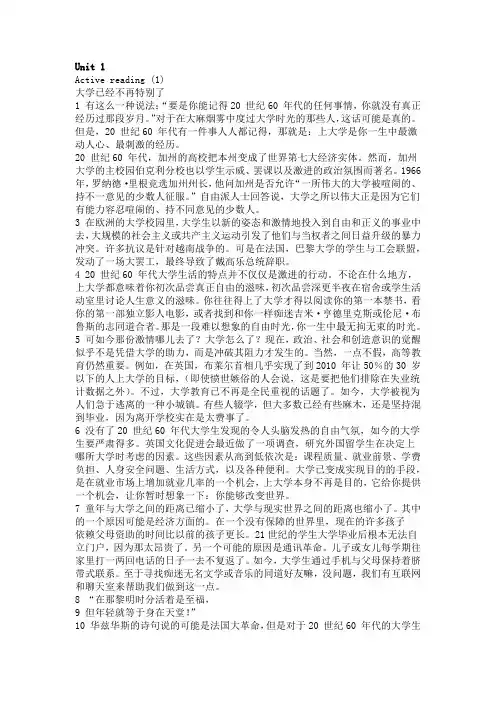
Unit 1Active reading (1)大学已经不再特别了1 有这么一种说法:“要是你能记得20 世纪60 年代的任何事情,你就没有真正经历过那段岁月。
”对于在大麻烟雾中度过大学时光的那些人,这话可能是真的。
但是,20 世纪60 年代有一件事人人都记得,那就是:上大学是你一生中最激动人心、最刺激的经历。
20 世纪60 年代,加州的高校把本州变成了世界第七大经济实体。
然而,加州大学的主校园伯克利分校也以学生示威、罢课以及激进的政治氛围而著名。
1966 年,罗纳德·里根竞选加州州长,他问加州是否允许“一所伟大的大学被喧闹的、持不一意见的少数人征服。
”自由派人士回答说,大学之所以伟大正是因为它们有能力容忍喧闹的、持不同意见的少数人。
3 在欧洲的大学校园里,大学生以新的姿态和激情地投入到自由和正义的事业中去,大规模的社会主义或共产主义运动引发了他们与当权者之间日益升级的暴力冲突。
许多抗议是针对越南战争的。
可是在法国,巴黎大学的学生与工会联盟,发动了一场大罢工,最终导致了戴高乐总统辞职。
4 20 世纪60 年代大学生活的特点并不仅仅是激进的行动。
不论在什么地方,上大学都意味着你初次品尝真正自由的滋味,初次品尝深更半夜在宿舍或学生活动室里讨论人生意义的滋味。
你往往得上了大学才得以阅读你的第一本禁书,看你的第一部独立影人电影,或者找到和你一样痴迷吉米·亨德里克斯或伦尼·布鲁斯的志同道合者。
那是一段难以想象的自由时光,你一生中最无拘无束的时光。
5 可如今那份激情哪儿去了?大学怎么了?现在,政治、社会和创造意识的觉醒似乎不是凭借大学的助力,而是冲破其阻力才发生的。
当然,一点不假,高等教育仍然重要。
例如,在英国,布莱尔首相几乎实现了到2010 年让50%的30 岁以下的人上大学的目标,(即使愤世嫉俗的人会说,这是要把他们排除在失业统计数据之外)。
不过,大学教育已不再是全民重视的话题了。

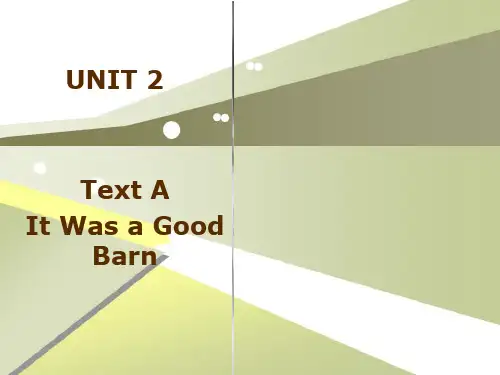
全新版大学英语第二版综合教程2课文翻译《全新版大学英语第二版综合教程 2》中的课文涵盖了丰富多样的主题和内容,为学习者提供了广泛的语言输入和文化视角。
以下是对部分课文的翻译,希望能对您的学习有所帮助。
课文一:《成长》这篇课文讲述了一个年轻人在成长过程中的经历和感悟。
“当我还是个孩子的时候,世界似乎总是充满了奇迹和神秘。
每一天都是一次新的冒险,每一个角落都隐藏着未知的惊喜。
”“随着年龄的增长,我开始意识到生活并非总是如我所愿。
困难和挫折接踵而至,曾经的梦想似乎变得遥不可及。
”“然而,正是在这些艰难的时刻,我学会了坚持和努力。
我明白了成功并非一蹴而就,而是需要付出持续不断的努力。
”“成长让我懂得了珍惜身边的人和事,也让我更加勇敢地面对未来的挑战。
”课文二:《友谊》“真正的友谊是一种珍贵的财富,它能在我们最需要的时候给予支持和安慰。
”“朋友是那些在你犯错时,不会嘲笑你,而是帮助你改正错误的人。
他们会在你成功时为你欢呼,在你失败时给你鼓励。
”“友谊不是建立在利益和交换之上,而是基于真诚、信任和相互理解。
一个真正的朋友会倾听你的心声,与你分享快乐和悲伤。
”“在这个快节奏的现代社会中,我们常常忙于工作和生活,忽略了与朋友的联系。
但当我们回首往事,会发现真正的友谊是那些经得起时间考验的情感纽带。
”课文三:《文化差异》“不同的国家和民族有着独特的文化,这些文化差异在日常生活的方方面面都有所体现。
”“饮食文化就是一个明显的例子。
在中国,人们喜欢围坐在一张大桌子旁共享美食;而在西方国家,分餐制更为常见。
”“礼仪方面的差异也不容忽视。
在某些文化中,直接的眼神接触被视为尊重;而在另一些文化中,可能会被认为是不礼貌的。
”“理解和尊重文化差异是促进跨文化交流和建立和谐世界的关键。
只有当我们摒弃偏见,以开放的心态去学习和欣赏其他文化时,才能真正实现文化的交融与共同发展。
”课文四:《科技与生活》“科技的飞速发展给我们的生活带来了翻天覆地的变化。
新起点大学英语综合教程2答案刘剑英A couple of odd things have happened lately. 最近发生了几桩怪事儿。
I have a log cabin in those woods of Northern Wisconsin. I built it byhand and also added a greenhouse to the front of it. It is a joy to live in.In fact, I work out of my home doing audio production and environmental work. As a tool of that trade I have a computer and a studio. 我在北威斯康星州的树林中有一座小木屋。
是我亲手搭建的,前面还有一间花房。
住在里面相当惬意。
实际上我是在户外做音频制作和环境方面的工作——作为干这一行的工具,我还装备了一间带电脑的工作室。
I also have a tree frog that has taken up residence in my studio. 除了一只树蛙也在我的工作室中居住了下来。
How odd, I thought, last November when I first noticed him sitting atop my sound-board over my computer.I figured that he(and I say he,though I really don’t have a clue if she is a he or vice versa) would be more comfortable in the greenhouse. So I put him in the greenhouse. Back he came. And stayed.After a while I got quite used to the fact that as I would check my morning email and online news, he would be there with me surveying the world. 去年十一月,我第一次惊讶地发现他(只是这样称呼罢了,事实上我并不知道该称“他”还是“她”)坐在电脑的音箱上。
Unit1我们先举两个例子。
Let’s start w ith two examples.1.对于大部分学生而言,英语是To most studen ts ,Englis h is one of the most import ant course s in colleg e.2.你需要的只是勇气。
Courag e is all you need.3.这项法律不适用于本案。
The law does not apply to this case.4.令我惊讶的是,我找到了书里所描述的地方。
Astonishing ly, I found the placed escrib ed in the book.5.作最好的打算,作最坏的准备。
Hope for the best, prepar e for the worst.6.她的姨妈去年去世后,给他留下了300万Her aunt died last year and left her with three millio n dollars.7.我无法忍受这个不断加重的课程负担。
I can’t stand this increa singly heavy coursew ork.Unit2有好几次我看见简和他们在一起。
I’ve seen Jane with them on severa l occasions.1.有人向我诶供了一份在日本的工作。
I have been offered a job in Japan.2.他喜欢球类运动,尤其喜欢打乒乓球。
He likes b all games , (and he likes) table tennis i n partic ular.3.小孩子们都喜欢在户外游戏。
Y oung childr en enjoy p layin g outdoors.4.他对政治问题感兴趣。
Unit 3 Born to WinBorn to WinYou cannot teach a man anything. You can only help him discover it within himself.— Galileo[1] Each human being is born as something unique , something that never existed before. Each person is born with what he needs to win at life. A normal person can see, hear, touch, taste, and think for himself. Each has his own unique potentials —his capabilities and limitations. Each can be an important, thinking, aware, and creatively productive person in his own right — a winner.[2] The words “winner” and “loser” have many meanings. When we refer to a person as a winner, we do not mean one who defeats the other person by dominating and making him lose. Instead a winner is one who responds genuinely by being trustworthy and responsive , both as an individual and as a member of a society. A loser is one who fails to respond genuinely.[3] Few people are winners or losers all the time. It's a matter of degree . However, once a person has the capacity to be a winner, his chances are greater for becoming even more so…[4] Achievement is not the most important thing for winners; genuineness is. The genuine person realizes his own uniqueness and appreciates the uniqueness of others.[5] A winner is not afraid to do his own thinking and to use his own knowledge. He can separate facts from opinion and doesn't pretend to have all the answers. He listens to others, evaluates what they say, but comes to his own conclusions.[6] A winner is flexible . He does not have to respond in known, rigid ways. He can change his plans when the situation calls for it. A winner has a love for life. He enjoys work, play, food, other people, and the world of nature. Without guilt he enjoys his own accomplishments. Without envy he enjoys the accomplishments of others.[7] A winner cares about the world and its people. He is not separated from the general problems of society. He tries to improve the quality of life. Even in the face of national and international difficulty, he does not see himself as helpless . He does what he can to make the world a better place.[8] Although people are born to win, they are also born totally dependent on their environment. Winners successfully make the change from dependence to independence . Losers do not. Somewhere along the line losers begin to avoid becoming independent . This usually begins in childhood. Poor nutrition , cruelty , unhappy relationships, disease, continuing disappointments, and inadequate physical care are among the manyexperiences that contribute to making people losers.[9] A loser is held back by his low capacity to appropriately express himself through a full range of possible behavior. He may be unaware of other choices for his life if the path he chooses goes nowhere. He is afraid to try new things. He repeats not only his own mistakes and often repeats those of his family and culture.[10] A loser has difficulty giving and receiving love. He does not enter into close, honest, direct relationships with others. Instead, he tries to manipulate them into living up to his expectations and channels his energies into living up to their expectations.生而成功任何事都不可能由别人来教你,只能在别人的帮助下靠自己去发现。
UNIT11.他的工作与动物有关。
His work has something to do with animals.2.为了天黑前到达,我们早早地动了身。
In order to arrive before dark, we started early.3.从她的口音判断,她一定是个北方人。
Judging by her accent, she must be from the North.4.如果你们要她来,就事先通知她。
If you want her to come, inform her in advance.5.我不清楚他为什么改变了主意。
I don't know why he changed his mind.6.多数人一旦学会游泳,就会喜欢上它的。
Most people like to swim once they have learned how (to swim).7. 你现在准备的越充分,考试时就越有信心。
The more preparations you make now, the more confidence you'll have in the exam. 8. 英语学好了,你就会经常用它。
而经常使用反过来又会使你学得更好。
If you learn English wll, you will use it often. The frequent use, in turn, will make you learn better.UNIT 21.我正在照料附近工厂的一位工人。
I am taking care of a worker from a neighoring factory.2. 我昨天晚上上床以后对这个问题反复进行了思考,但仍然找不到解决方法。
After going to bed last night, I turned the matter over and over in my mind and still could't find a solution.3. 不管天气多冷或多热,我都每天坚持练习。
UNIT11.他的工作与动物有关。
His work has something to do with animals.2.为了天黑前到达,我们早早地动了身。
In order to arrive before dark, we started early.3.从她的口音判断,她一定是个北方人。
Judging by her accent, she must be from the North.4.如果你们要她来,就事先通知她。
If you want her to come, inform her in advance.5.我不清楚他为什么改变了主意。
I don't know why he changed his mind.6.多数人一旦学会游泳,就会喜欢上它的。
Most people like to swim once they have learned how (to swim).7. 你现在准备的越充分,考试时就越有信心。
The more preparations you make now, the more confidence you'll have in the exam. 8. 英语学好了,你就会经常用它。
而经常使用反过来又会使你学得更好。
If you learn English wll, you will use it often. The frequent use, in turn, will make you learn better.UNIT 21.我正在照料附近工厂的一位工人。
I am taking care of a worker from a neighoring factory.2. 我昨天晚上上床以后对这个问题反复进行了思考,但仍然找不到解决方法。
After going to bed last night, I turned the matter over and over in my mind and still could't find a solution.3. 不管天气多冷或多热,我都每天坚持练习。
No matter how cold or hot it is, I keep practicing every day.4. 为了得到所期望的一切,你应该从今天就开始努力。
To achieve what yo haope for, you should start working hard from today.5. 虽然分别了三年,但我们仍然保持着友谊。
Although we have been apart from each other for three years, we still keep our friendship going.6. 天下雨了。
结果我们大家都没能去听音乐会。
It rained. As a result, none of us could go to the concert.7. 如同很多大学生一样,我们学校的学生非常爱看这个作家的小说。
Like many college students, students of our universtity love to read the novels of this author.8. 我的健康在很大程度上都归功于医生和护士的照顾。
My health is to a large extent due to the care by the doctors and nurses.UNIT 31.大约200人出席了昨天的会议。
An estimated 200 people attended yesterday's meeting.2. 我很喜欢那所面对大海并有两扇大窗户的房子,可是我买不起。
I like thehouse with two large windows facing the sea, but just can't afford it.3. 根据新的规则,乱贴光广告最高可以罚款一万元。
Accoring to the new regulation, posting ads without permission can be fined for as much as 10,000 yuan.4. 在很大程度上,我们对自己的言行负有责任。
To a great extent, we are responsible for what we say and (what you) do.5. 我们应该充分利用因特网上的各种资源。
We should make the most of all kinds of resources on the Internet.6. 如果你满足于每个月只挣2这么一点点钱的话,卖报倒是个蛮好的工作。
If you are content to make such a small amount of money every month, selling newspapers is a pretty good job f or you.7. 观察与探索是在科学研究中做出新的重要发现的常用方法。
Observation and exploration are common means in scientific research that could bring major discoveries.8. 只有当初你彻底分析了情况以后才能搞清这些关系。
You can't understand the relationships untill you analyze the situation in great depth.UNIT 41.如今,我们越来越依赖信息与计算机技术。
Nowadays we are increasingly relying on information and computer technology.2. 这意味这条新规定对国有企业喝死人企业都很有利。
This means the new regulation is of great benefit to both the state-owned and the private businesses.3. 他正在慢慢的适应下岗人员的生活。
He is slowly adapting to the life of a laid-off worker.4. 人事部经理说:“首先,你必须集中精力考虑以下问题”.The personnel manager said, "First, you must focus on the following problems."5. 梦想有缘不会成为现实,除非人们明白实现这一梦想要做什么。
A dream will never become a reality unless one understands what it will take to achieve the dream.6. 由于生意不景气,公司让20名工人下岗。
As business is bad, the company laid off twenty workers.7. 这家公司生产的这些产品有专门用途。
The products manufactureed by this company are for specific purposes.8. 彼得正在找工作,因为他的钱仅够维持一个月。
Peter is hunting for a job now, as his money will only last him one month.UNIT51.她很小心,不会在开车时冒险。
She is very careful. She won’t take a risk when driving.2.那些酷爱足球的人可以享受到巨大的乐趣。
Those who have a passion for football can experience great enjoyment.3.除了青少年以外,其他年龄的男男女女也都喜欢登山。
In addition to teenagers, males and females of other ages also enjoy mountaineering. 4. 他的学生们对他十分尊敬。
His students look upon him with respect.5. 邀请来给我们作演讲的是史密斯博士。
It was Dr. Smith that we invited to give us a lecture.6. 比起普通邮件,电子邮件的优点之一是速度快。
One of the advantages of e-mail over a regular mail is that it is fast.7. 只有具有健康的身体,我们才能学习好、工作好。
Only with good health, can we study well and work well.8. 如果将汤姆与其他同学相比,你会发现他既会用功又懂得休息。
If you compare Tom with his classmates, you will find he works hard and knows how to relax.UNIT 61.母亲出去工作了,所以父亲负责在家照看孩子。
The mother went out to work, so the father took responsibility for looking after the children at home.2.研究表明吸烟与肺癌直接相关。
Research shows that smoking is directly related to lung cancer.3.父母应该关心孩子在学校里的表现,Parents should be concerned about their children's performance at school.4. 过分担心身体可能真的会使你生病。
Your too much worry over your health may really make you sick.5. 村长指出,由于人们从全国各地纷纷前来参观这棵树,它已经成了一个财源。
The head of the village pointed out that the tree had become a source of income, as tourists had been coming fr om all parts of the country to see it.6. 妈妈说:巧克力可以吃,但每天只能吃一块。